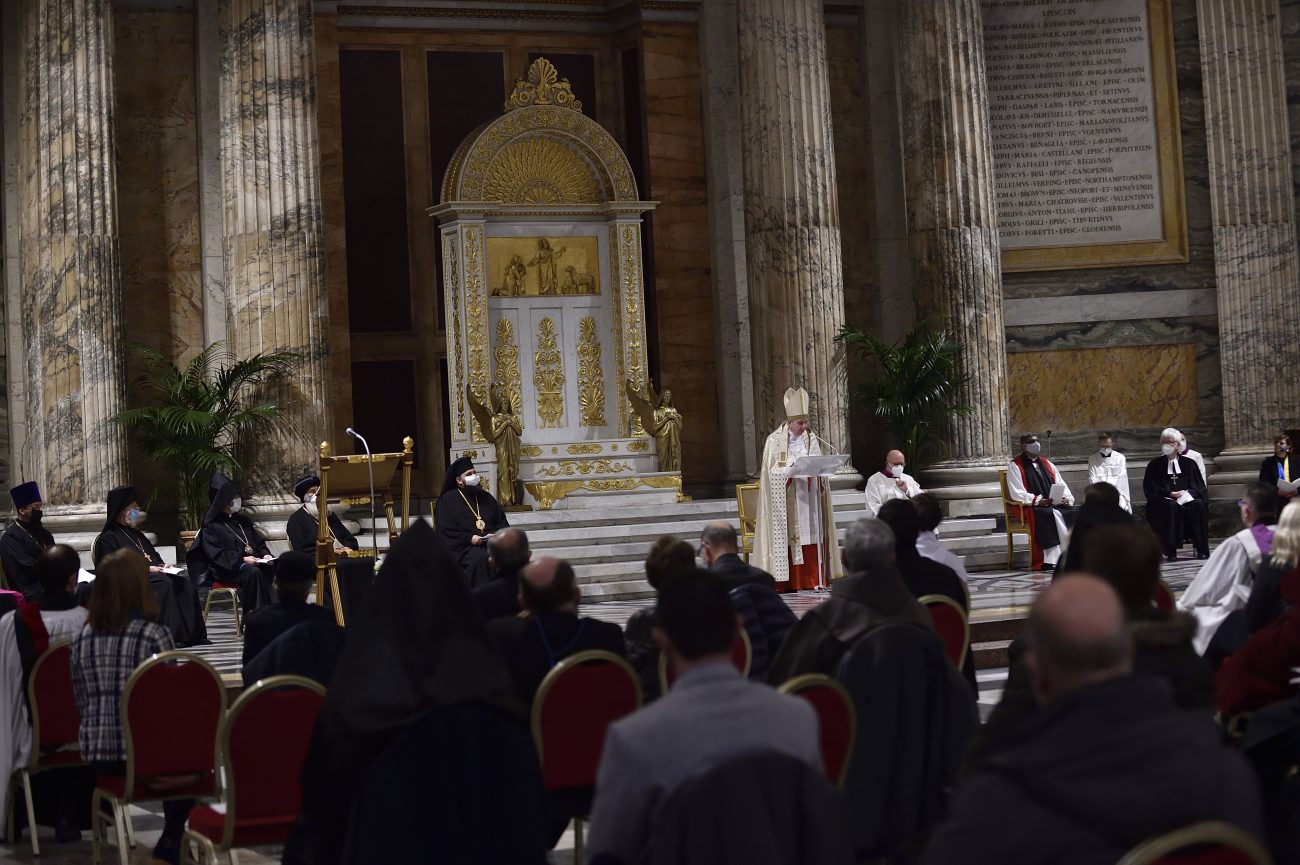ROME (CNS) — Abiding in God’s love means nurturing one’s relationship with him and with all those whom God loves, Pope Francis wrote in his homily for the conclusion of the Week of Prayer for Christian Unity.
“If our worship is genuine, we will grow in love for all those who follow Jesus, regardless of the Christian communion to which they may belong, for even though they may not be ‘one of ours,’ they are his,” the pope wrote for the prayer service Jan. 25 at Rome’s Basilica of St. Paul Outside the Walls.
While a flare-up of sciatica, a painful nerve condition, prevented the pope from presiding over the ecumenical vespers, his homily for the service was read by Cardinal Kurt Koch, president of the Pontifical Council for Promoting Christian Unity.
[hotblock]
The theme for the 2021 celebration, chosen by the World Council of Churches and the Vatican, was “Abide in my love and you shall bear much fruit.”
Because of the COVID-19 precautions, only invited guests — Catholic, Orthodox, Oriental Orthodox, Anglican, Lutheran, Methodist, Waldensian, Salvation Army and other Christian representatives — were able to gather for the prayer at the basilica built over the tomb of St. Paul.
In his homily, Pope Francis noted that the Jesus’ admonition to his disciples, “abide in my love,” is part of Jesus’ discourse on “the vine and the branches.”
“The Lord himself is the vine, the ‘true’ vine, who does not betray our expectations, but remains ever faithful in love, despite our sins and our divisions,” the pope said. And all people who are baptized are grafted on to that vine.
Each Christian, he said, is called to maintain and strengthen his or her adherence to God, his or her place on the vine, through prayer.
“In today’s fast-paced and complex world, it is easy to lose our compass, pulled as we are from every side,” he said, but “Jesus tells us that the secret of stability is to abide in him.”
“Personal prayer, spending time with Jesus, adoration — these are essential if we are to abide in him,” the pope wrote. “In this way, we can place our worries, hopes and fears, joys and sorrows in the Lord’s heart.”
But an individual’s connection to Jesus also is the source of the “vitality” needed to live the Christian faith and to love others, he said.
“To the extent that we abide in God, we draw close to others, and to the extent that we draw close to others, we abide in God,” the pope wrote.
“Prayer unfailingly leads to love; otherwise, it is empty ritual,” he said. “It is not possible to encounter Jesus apart from his body, made up of many members, as many as are the baptized.”
And like the branches that Jesus said would need to be pruned sometimes, each Christian will have defects or shortcomings that will need to be pruned away, he said.
“Let us ask the Father, then, to prune our prejudices with regard to others, and the worldly attachments that stand in the way of full unity with all his children,” Pope Francis wrote. “Thus purified in love, we will be able to be less concerned about the worldly obstacles and stumbling stones from the past, which nowadays distract us from the Gospel.”
And while unity among Christians is essential, it is not enough, he said. God “impels us to love not only those who love us and think as we do, but to love everyone, even as Jesus taught us.”
Strengthened in unity, he said, Christians will work together to love all their neighbors and to be “good Samaritans to a humanity that is frail, poor and, in our own time, suffering so greatly.”
“A tree is known by its fruits,” the pope wrote. “By our gratuitous love it will be known if we are part of the vine of Jesus.”
PREVIOUS: At Mass, Minsk archbishop hands over archdiocese to administrator
NEXT: Corporate-sponsored cathedral soup kitchen helps Seoul’s homeless



Share this story